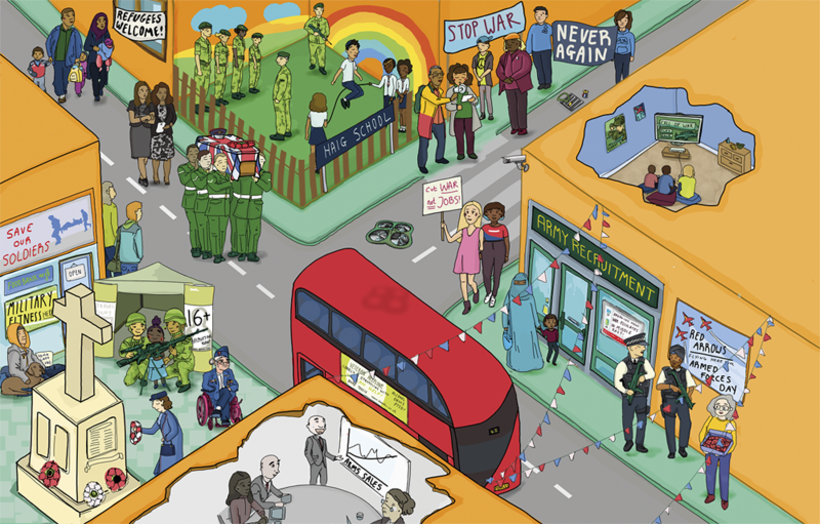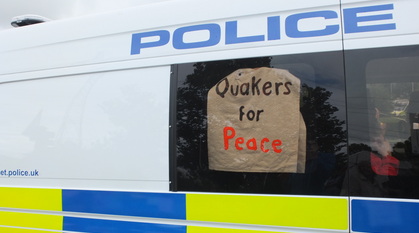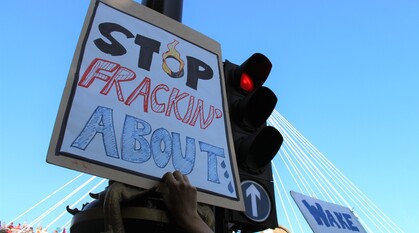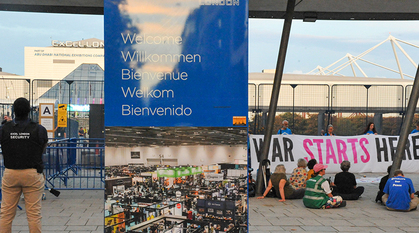Starting conversations about militarism
A new poster is opening up difficult conversations about militarism in and out of the classroom.

June 2018 marked the ninth annual Armed Forces Day. Across the country people took part in parades, watched marching bands, and snapped selfies of themselves saluting to post on social media. Soldiers demonstrated weaponry and vehicles to children and teenagers, and fighter jets zoomed overhead to the delight of assembled crowds.
Everyday militarism
However, not everyone was caught up in the spirit of the day. Quakers were among many questioning the motives and merits of a nationwide celebration of Britain's war apparatus. Inspired by the Quaker peace testimony which regards all life as precious, they joined with groups like the Peace Pledge Union and Forces Watch to suggest an alternative message: that war is failure and we should always seek another way to resolve disputes.
Some unfurled 'war is not family entertainment' banners, others gave out leaflets. In Bury St Edmunds around 40 Quakers and non-Quakers held a silent vigil, and some spoke on local radio. These were brave acts, met with positivity but also much hostility.
Armed Forces Day is one of the more obvious examples of militarism in our society. There are many others: adverts for arms companies, camouflage clothing, or military-themed computer games. These are what we call “everyday militarism" – omnipresent but often unnoticed.
Spot the militarism
In the peace education team we are opposed to militarism and its increasing influence on young people's lives. But we want to raise this with young people in a way that allows them to come to their own conclusion about its effects – to 'show not tell'. We recently asked Abbey Thornton, a young Quaker artist, to help us do just that.
About the poster, Abbey said, "We wanted to ensure that as many elements as possible were covered, positive and negative. But it was also important to me not to dehumanise anyone – I hope my cartoon style achieves that. I wanted to represent everyone equally so people viewing it could make their own informed decision. It's important to understand what's happening, but while respecting, not hating, people involved or in the military. I hope that this poster will be used to begin conversations. Militarism is like an optical illusion: initially it's invisible, but once you see it, you can't unsee it."
You can download the poster in full on our website or experience an interactive version. You can also order a physical poster in English or in Welsh. There is also an accompanying set of exercises which could be used to start discussions in a Quaker meeting, as well as in a classroom.
Everything you might spot in the image is an aspect of militarism that you could see on the streets of Britain: children are recruited to the army at 16, there are thousands of homeless veterans, and refugees from war do seek sanctuary here. What the image doesn't tell you is what to think about those things.
Starting conversations
In the classroom, students can use the resource to discuss why things are happening, what the effects might be and what connections they might make. In a school recently, some students found the armed police reassuring, while many of their peers found them scary. Some were really horrified by the soldiers showing a rifle to a small girl.
We hope lots of constructive conversations will flow from it, making 'everyday militarism' a common phrase – and, like 'everyday sexism', something that is more and more unacceptable to British society.


